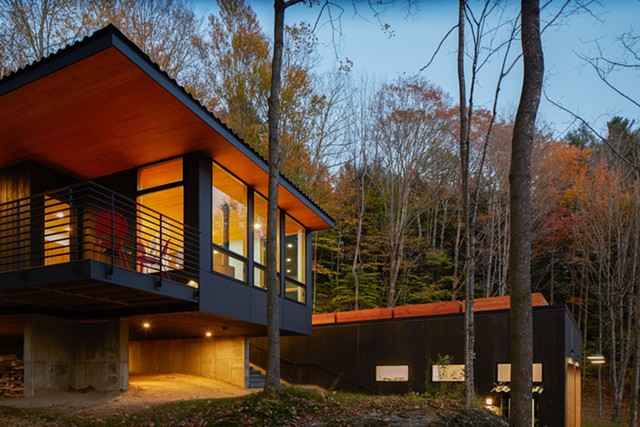click to enlarge 
- Erica Allen Studio
- The Mad River House in Warren by McLeod Kredell
McLeod Kredell Architects in Middlebury has garnered a slew of awards, which the firm modestly buries within its website. These include
American Institute of Architects-Vermont awards for excellence in design in 2011, 2013, 2014 and 2015, and AIA-New England awards in 2013 and 2017.
On May 4 this year, it won recognition of a more international sort: McLeod Kredell became the first Vermont firm to be named to
Architectural Record’s Design Vanguard. The industry’s leading magazine in the U.S., which has a broad global readership, started the Design Vanguard award in 2000. Each year, its editors identify 10 emerging firms to watch around the world.
Early winners included
Jeanne Gang,
Bjarke Ingels and
David Adjaye, now internationally renowned architects. The Design Vanguard 2020 class puts McLeod Kredell in the company of firms in New York City, Chicago, Los Angeles, Germany, Chile, South Korea and Hong Kong.
Abiding by the new coronavirus allowance of two workers per office, Steve Kredell and John McLeod were both at their desks when
Seven Days reached them by phone. Kredell summed up the significance of the award: “This is bigger [than our other awards] because it’s not for individual projects; it’s about the way we approach architecture. We really think architecture is about the user, but we’re also thinking about the people passing by. It’s bigger than itself. It’s a contributor to the community.”
The firm certainly contributes to several communities in concrete ways. The two architects bring a team of Middlebury College students to Penobscot Bay, Maine, for a weeklong design-build class each summer that results in such useful community projects as a picnic pavilion or composting station. It also has an ongoing partnership with
Habitat for Humanity of Addison County and Middlebury College — where McLeod teaches — to design and build houses in the county for those in need.
The
Architectural Record editors recognized this approach in their profile of the firm, writing, “Through teaching, working with private clients, partnering with communities, and building alongside students and volunteers, they practice an architecture that gives back, and honors people and place.”
McLeod Kredell’s clean lines and “appropriate local expressions of universal qualities and ideas,” as its website states, can be seen in a number of Vermont projects. Among its many distinctive residences is McLeod’s house in Weybridge, completed in 2011, the year of the firm’s founding. The wood-shingled structure has a sloping shed roof that would read “modern” were it not for the living green roof atop part of it, which helps it blend into its wooded surroundings. The house was featured in
Dwell magazine and the weblog
ArchDaily and won the AIA-VT’s top award.
Nonresidential projects include Middlebury College’s computer science building, a metal-skinned shed-like structure whose window placement reads like a Mondrian; the fun interior of the
Vermont Comedy Club bar in Burlington; and conversion of the
Stone Mill in Middlebury to a multiuse community hub with coworking, coffee shop, retail and Airbnb spaces.
These projects were among the portfolio of work McLeod sent the magazine when he decided to answer its call for entries last year. “I’ve been wanting to get into
Record for 25 years,” he said. “I’ve been reading it since the 1990s.”
McLeod had noticed that Design Vanguard classes of the last few years consisted of “pretty wild and progressive choices,” including a firm that had caught the Middlebury pair’s attention —
Omar Gandhi Architect in Nova Scotia — for its interesting approaches to building in a climate and geography similar to Vermont’s.
McLeod added with a laugh, “I really didn’t think we’d get picked, but I wanted to get [
Record’s] attention. I thought we’d submit for a few years, and then they’d maybe decide to feature one of our projects.”
McLeod and Kredell met in 1993 in graduate architecture school at Virginia Tech and went on to work for the same New York City firm, Rogers Marvel Architects (now two separate firms). Kredell then worked for
TruexCullins in Burlington and McLeod for himself in Middlebury until they joined forces. So, while neither architect is technically “emerging,” their firm, at only 9 years old, is considered so.
“Architecture is one of those fields where it takes a long time to get competent,” McLeod commented. “It’s a process of getting years of experience working for other architects before you’re ready to go out on your own.”
All that thinking and training has led the pair to one bedrock idea. Said Kredell, “We really think good design is for anyone anywhere.”

















































